#Buddhism in Word of Honor
Explore tagged Tumblr posts
Text
wuxia, xianxia, and cultivation differences meta
translations: wuxia 武俠, xianxia 仙俠, and cultivation 修真/修仙 (xīuzhēn/xīuxiān)
think i've seen posts on this eons ago, and i'm pretty sure there are tons of these online, but since this has been written up already let's just have another one.
wuxia 武俠
wuxia and xianxia sound similar, but basically for wuxia it is about the pugilistic world (江湖 jiānghú). It is relatively more down-to-earth, and people practice martial arts ("kungfu") in their current life -- they do not do it to become xians (仙) and gods (神) however.
Like Thousand Autumns and Faraway Wanderers/Word of Honor, it has more historical background and ties to the current court and kingdoms, because people are living in the moment and concern themselves with worldly issues.
Martial arts may seem unrealistic, but in view of chinese fantasy it would be considered "real". It consists of fighting moves and internal energy, which they call qi or nèigōng (內功), and at times you see people flying around, climbing hills and jumping across rooftops which is qīnggōng (輕功).
xianxia 仙俠
A level up would be xianxia, where characters in the story cultivate to become xians (and gods, like in the heaven official's blessing). They don't really care about earthly issues here now, because their ambitions lie beyond the current world, and cultivation, getting stronger, and an immortal life are majorly all their goals.
You may not always see them working towards that purpose, such as in mdzs they are considered a lower-xianxia society (低魔), meaning people don't go through all the steps of cultivation and only stay at the stage before the "golden core" stage.
In xianxia, characters still learn basic fighting moves aka. martial arts, but to direct the internal energy they use línglì (灵力), zhēnqì (真气), and fǎlì (法力), all xianxia terms you commonly see. "neigong" is practically nonexistent in this genre. That's why people building up their "neigong" instead of "lingli" are likely never going to be able to cultivate.
cultivation 修真/修仙
A subgenre in the xianxia category would be cultivation. Characters actively go through the stages of cultivation, and likely for the MC, because they are the main character, they successfully become a xian and exit the world at the end of the novel.
There are many stages of cultivation, usually defined at the beginning of the novel in the synopsis, and a typical example of the different levels would be this:
练气,筑基,金丹,元婴,化神,炼虚,合体,大乘,渡劫
And with a cursory search, an English translation would be something like this, albeit not with all the cultivation ranks identified.
Qi condensation (练气), Foundation establishment (筑基), Core Formation (金丹), Nascent Soul (元婴), and the names after that vary too greatly with translation and fandom so I'll jump straight to Immortal Ascension
extra info: getting into the philosophy of it all
It'd be interesting to note that the word "xiá" (俠) permeates all these genres. This is something akin to the concept of "hero", but not at all also, and I'd love to speak more on this but this post has already gone way longer than I hoped it would be, so perhaps another day.
Regardless, it is interesting to note that wuxia has a greater emphasis on "xia" than xianxia. (some joke that cultivation doesn't have the word "xia" in it, and much of that is because characters have foregone heroism and focused on gaining powers and working towards ascension instead). As a result, wuxia is more confucianism-oriented, though not without its taoism and buddhism influences.
xianxia, on the other hand, is mainly derived from "dào" (道), from taoism, which is another lengthy concept if I ever get to it.
And some may have heard of the "farming" genre, 种田 (zhòngtián). This has to do with golden fingers (mary sues) in imperialistic china, earning a wealth of money, and all that. It has nothing to do with cultivation, alike they sound in english.
that's it for now, hmu if you wish to ask/discuss!
(and apologies for the pinyin translations, hope it's understandable still! formally writing pinyin they are supposed to be two separate words not one.)
#danmei#mdzs#word of honor#cdrama#thousand autumns#cnovel#wuxia#xianxia#cultivation novel#chinese language#chinese#fate's meta
3K notes
·
View notes
Text
Did Enji atone to Touya (and his family) and stepped up on his role as a father?
Boku no Hero Academia has a grave 'flaw'. The fact that's strongly tied to Japanese culture and Buddhism makes it a very interesting work but also makes it a hardly international work because way too many cultural things are left unexplained because they're assumed to be a given. Only they're not when the work is read by foreign readers. And this lead to confusion.
The Todoroki plotline is an example of this.
In the west many feel Enji did nothing for Touya or did too little because the little he did is a given in the west. The point is... it's not a given in Japan. In Japan is a BIG DEAL. So let's go though it.
First, the fact that he doesn't want to kill Touya even though he's a criminal

Todoroki Enji ‘Ore wa ikinobite mo... ENDEAVOR wa shinda. Tairyō satsujinsha (read: musuko) to tatakaenai.’ 轟炎司「俺は生き延びても...エンデヴァーは死んだ。大量殺人者��むすこ)と戦えない。」 Todoroki Enji “Even if I survived... Endeavor is dead. I can't fight against a mass murderer (read: my son).”
Let's compare it to these two scenes of "Death Note" and see how Yagami Soichiro, a policeman, is taking the idea his son might be a killer and how, although Misa protests, the story doesn't present it as him being crazy but as it being his duty.
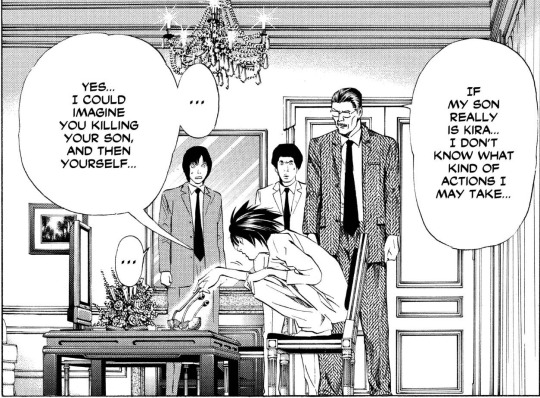
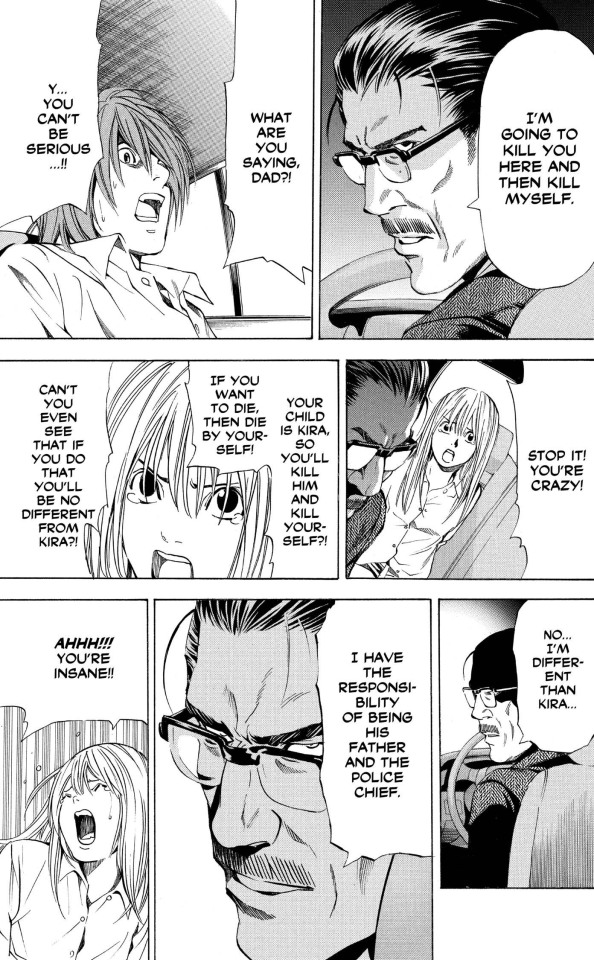
That's why Hawks doesn't want to send Enji, who's on an atonement path, to face Dabi, because Enji might end up in a situation in which he would have to kill his son and he would refuse... which is more or less what happens.
Second, Enji acknowledges that what Touya said is true, Touya is his son and Enji did what he did. In such a situation many would lie. Dabi's video proves nothing. He is a Villain, they had a doctor in the team who could create Nomu, the paternity test could be fake, even if Dabi were to provide a sample of his blood or skin they could insist that's fake.

Society didn't want the truth, they didn't want Enji to confess, they wanted him to reassure them, they even commented he should have lied because yes, that's what's done often.


Basically he put his honor on the chopping block. A public apology like this one is a BIG DEAL in Japan. It's much more serious than in western countries and he does it when he could have spared himself and say Dabi lied but that would have meant to deny his son.
Third, it connects to the first in a way. While Enji is unwilling to kill Touya, he's willing to die with him. It's ‘shinjū’ (心中 Lit. “Mind/heart center/inside” but more likely means “oneness of hearts”, probably reflecting a psychological link between the participants) and it’s a word used in common parlance to refer to any group suicide of two or more individuals bound by love, typically lovers, parents and children, and even whole families. People who commit shinjū believe that they would be united again in heaven, a view supported by feudal teaching in Edo period Japan, which taught that the bond between loved ones would continue into the next world, and by the teaching of Pure Land Buddhism wherein it is believed that through shinjū, one can approach rebirth in the Pure Land. By volunteering to die with him, Enji is basically agreeing to remain with him in their next reincarnation.
For us it's crazy, it's Enji giving up on saving him. In Japan it sounds like 'I love you and I want to be with you'.
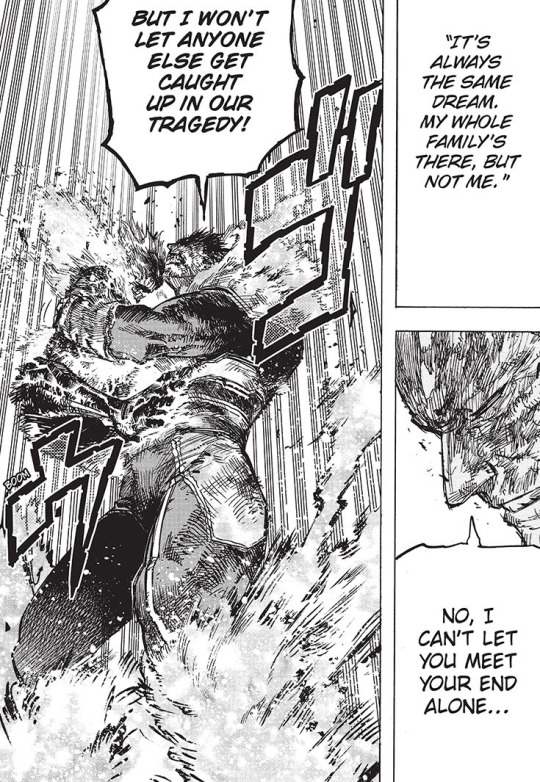
Forth, he'll apologize to Touya. As said before it's a BIG DEAL, especially since Enji is the family head and, although for us most of what he did is wrong, in Japan most of what he did is well within what he can do. Marrying a woman you don't love in a combined marriage to expect the child who'll be born from it will fulfill your ambitions and not really bothering to raise it because that's a mother job, well, things are changing in Japan but none of the above is a crime. In a not so distant past it was actually the norm. Yet Enji apologizes even though normally a family head wouldn't.
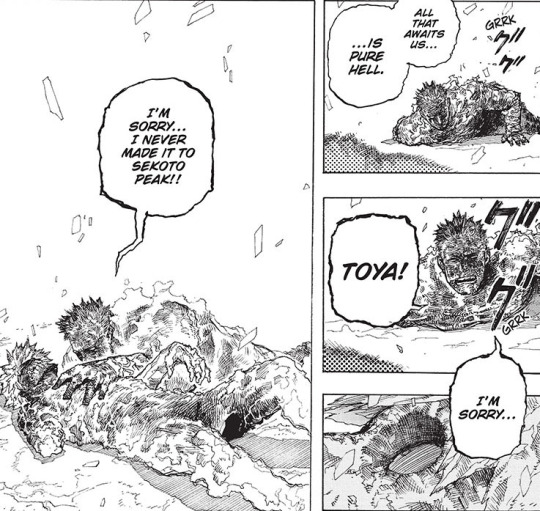
Fifth it's a bit in the first point and in the second but it'll drag on through all the story, Enji won't reject Touya. He's the only one (except Fuyumi who however doesn't get to say much) who never calls him Dabi after the reveal, and he won't strike him out of the family register but will keep on considering him his son.
Look at the Tobitas instead and at how they kick their son out.

Don't think Hawks is cutting strings with his parents solely because they were abusive, the Tobitas show us how you should just cut strings with a criminal. Same as the Togas.
Have "Theseus no fune" in which a man accused to be a murderer, send a birthday gift to his son and watch the reaction of his wife.
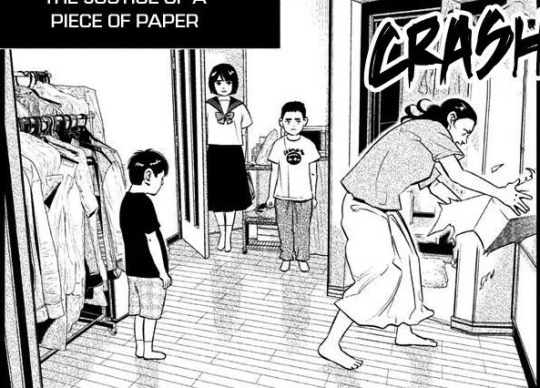
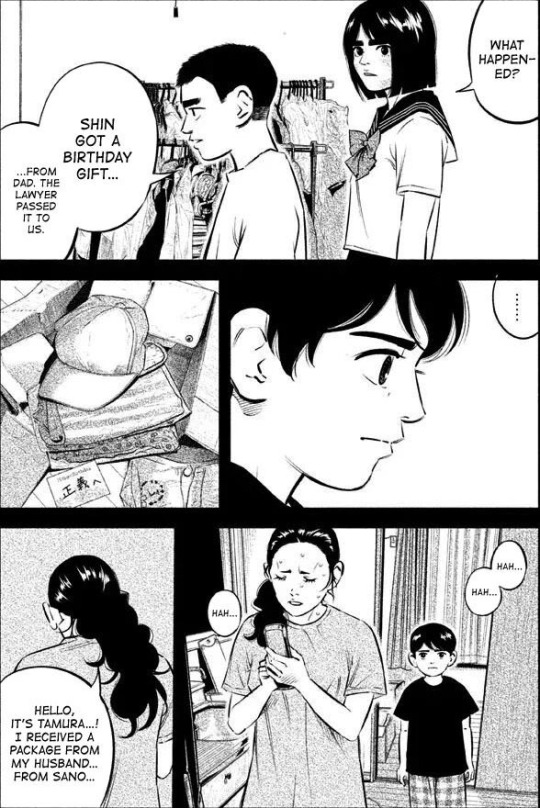
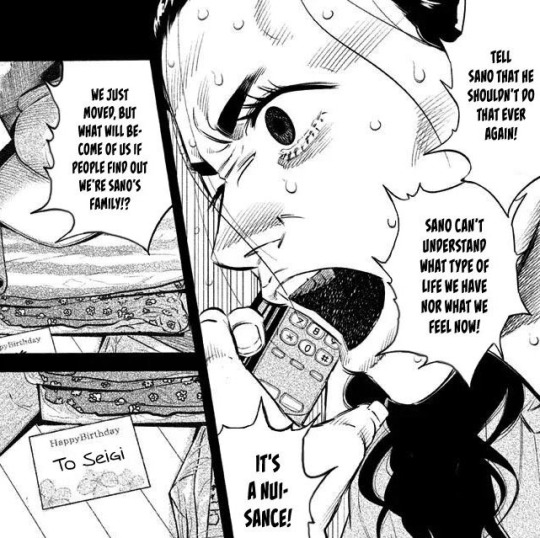
They don't want to keep contact with a criminal. It's scary because they'll be mistreated if they are discovered to be related to him.
And, in this vein, the fact he wants to go see him, that he'll keep on seeing him till the end instead than turning his back on him, is seen as important. It's seen as him being his father.
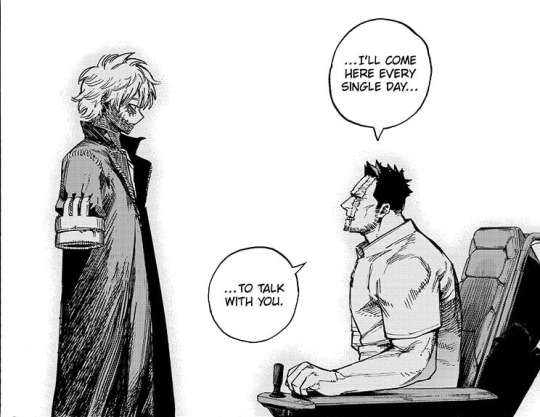
To many of us it seems as if he's forcing his presence upon Touya. Actually, from a Japanese perspective he's instead not abandoning him like many others would.
And since Touya is dying, very likely the talking will be the talking that's done in a Buddhist culture when someone is dying. Death should occur in a calm and peaceful environment, with close friends and family in attendance. Together they should reflect on the good deeds the dying person has done throughout their life, in the hopes it will help them in their next reincarnation. Additionally, family and friends can perform good deeds on behalf of them, which they believe will be of merit to the deceased.
So, since Touya is dying he won't get a scolding like Chisaki, they'll all only tell him nice and soothing things so he'll die peacefully.
Now... in the west all this is absolutely way too little, and in some points even feels wrong. Dying together instead than insisting in trying to save him? Deciding unilaterally to show up every day? Not our thing...
We can totally say 'thanks, I hate it' because we grew up with Darth Vader who instead gave his life to SAVE his son. All this accepting that Touya instead is going to die so Enji can at best die with him or keep him company until he does... well, it's mostly not our cup of cultural tea.
In in Japan though, all Enji does is important. Enji is doing something for Touya as a father, something important many fathers wouln't do for their sons.
Does it would satisfy a Japanese audience? They'll get the message better than us... but things are changing and anyway it can still feel too little. "Death Note" is dated 2005/2006 and back in it Misa was already questioning the idea of a father killing his son and then killing himself. BNHA is more innovative as Enji doesn't think to kill Touya but he still goes for the 'let's die together' route... and Horikoshi subtly criticizes it by having the rest of the family decising they'll try to stop the fire before just giving up. They're willing to die, but not before trying.
Enji represents plenty of old theories after all, which Horikoshi acknowledges were moved out of wrong beliefs, not moved by mean intents... which, is possible, would still not be enough for Japanese readers either because among teenagers, the target audience, there's an increasing number of teen who, in Japan, are forced to leave home (the Toyoko Kids) and often ends up committing crimes to survive and the league seems to be based on all the kind of homeless people Japan has.
While for a kid at home with a loving family being told that his father will die with him if he messes up instead than just dumping him might be comforting... for a kid that was abused and forced to leave home this might feel not enough.
People want to be saved, being told it's too late to save them, might be a lesson for those who hadn't done anything wrong yet so that they won't do it, but it's surely not a hopeful message for who instead got himself into troubles.
But well, that's something for the Japanese audience to ponder.
There's also to point out that, even though the message is not hopeful, Horikoshi is seeing the homeless people and acknowledging they should be helped.
Japan in regard to the Toyoko kids is mostly like the old woman who pretended not to see Tenko but that, in the end, helps that new boy.
I think Horikoshi's message desperately wants to be hopeful even for them, that he wants BNHA be like Midoriya's final stand, something that will push people to acknowledge they exist and reach out to help them.
It just that... it gets lost in what I'll call the 'litteral translation'.
No one explains us how we should jusge the scenes and, since we lack the cultural background, to us they are perceived differently because to us things work differently.
And, personally, even when I think I figured out the author's intent and can see the positivity of it, the cultural filter is still too tick and the picture gets blurried.
It's like being beginner at speaking a foreign language and having to constantly translate it in your head. The message loses its natural beauty, get simplified and not fully grasped.
I think I understand how Enji's atonement works in regard to Touya... it still doesn't feel fulfilling to me. But enough about Touya.
'Now,' you might rightfully say, 'fine, I'll bite, let's assume what Enji has is an atonement arc for Touya. It doesn't work at all in the west but let's give it a pass. What about his other kids?'



Natsuo and Fuyumi's wishes are in conflict.
Fuyumi wants the five of them to be a family (at the time she doesn't know Touya is alive), Natsuo doesn't want to be part of a family with Enji.
Enji's solution is giving Fuyumi a house in which she can welcome her mother and live with Natsuo (and Shouto when he comes home), while he removes himself from the equation. The solution fulfills Natsuo's wish of not seeing Enji because it makes him feel bad. It only partly fulfil Fuyumi's wish because it'll allow her to have her mother back (Rei couldn't bear meeting Enji either) and to stay with her siblings... but Enji takes responsibility for it, he doesn't tell her it's due to Natsuo that he can't live with them, so, in theory, it won't be Natsuo the one who's stressed to be at home when Enji is there and the one who has to leave home because he can't stand the sight of Enji.


There are many things I can say on how this is not a good solution (it doesn't make Natsuo feel better, it just stops him from feeling worse), but there are two points to consider. The first is that Enji is getting old and it would be his children's duty, due to filial pity, to take care of him, instead he's basically giving them the means to leave and take his wife with them.
Actually, since Natsuo is now the oldest MALE, it should fall on him specifically. Yes, Enji always intended to have Shouto inherit his mantle but this doesn't free Natsuo from his duties. Instead Enji is letting all his children free.
Even with Shouto, he doesn't insist anymore for Shouto to learn Flashfire Fist as his heir but just as an intern.
I take this is big in Japan.
Here again, not so much, especially in the countries in the west that think kids should leave their parents' home as soon as possible and we don't think our children are obliged to inherit our mantles.
Note how the story implies that this was meant to be the end for the Natsuo/Enji arc.
Natsuo made clear he didn't want to meet Enji again, he does it solely because they've to stop Touya and, once they've stopped Touya, he makes clear he doesn't want to see him again.
If we want though, the fact he's leaving the family can be seen as a concession in a way.
Since apparently Rei wants to stay with Enji (and likely their old house was devasted because that's what happens to relative of criminals) Enji can now move with Fuyumi and Rei and Natsuo won't have to see him because he'll leave home... to make his own home.
As for Shouto... Horikoshi answered his request by basically showing him Enji being a father for Touya and then promising he would protect them from the fiery fallout, which Horikoshi doesn't show at all because it's another thing that's a given in Japanese culture, it'll be hell for Enji to protect them, but not for us.
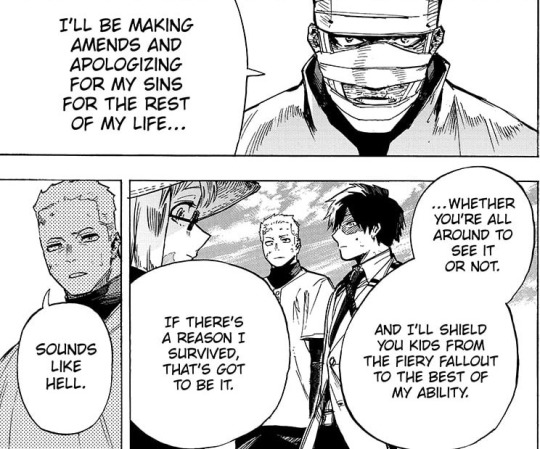
Just to get an idea of the fiery fallout here are some images from "Theseus no fune" again showing you how bad is this sort of thing.
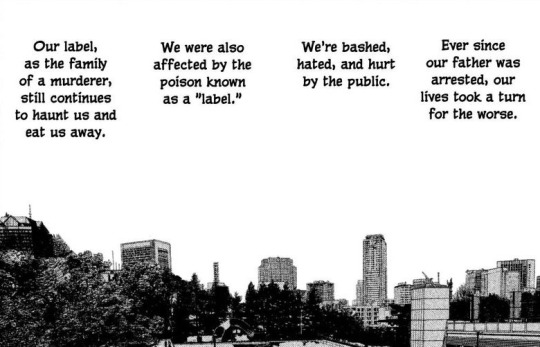
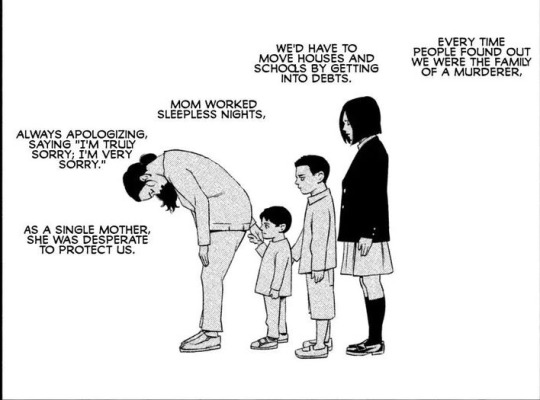
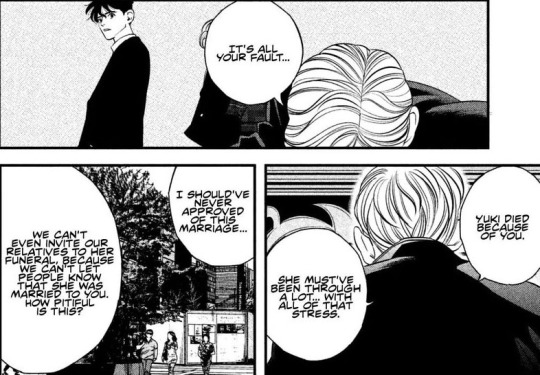
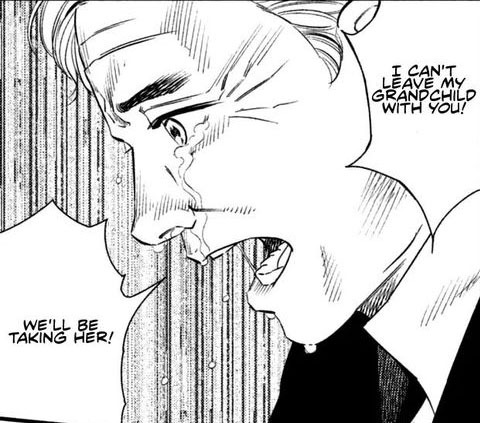
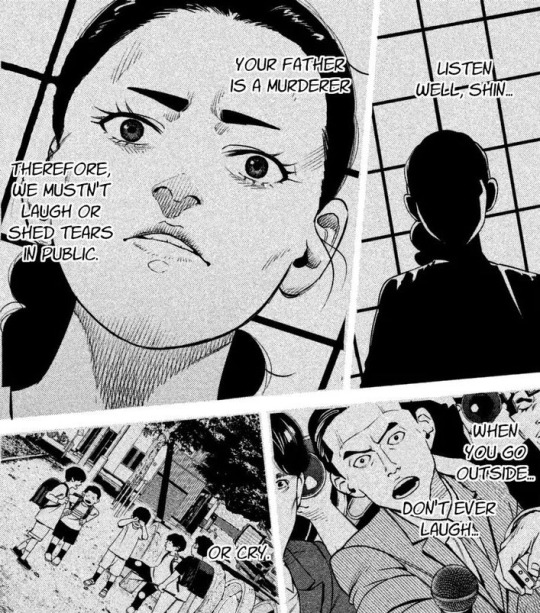
Back to Enji, Horikoshi gives us verbal confirmation that Enji is now being a father by being willing to do this, by having Natsuo, who never called him as such, calling him father for the first time.
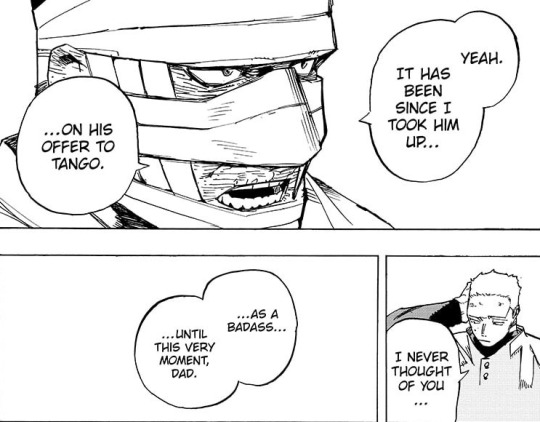
For Horikoshi that's Enji being a father.
Again, we've no idea of which hell Enji will suffer because that's not part of our culture. I've posted above screencaps of "Theseus no fune", that's how the fallout should be so not pretty at all.
So the fact that Enji will try to protect them from it is, again, BIG.
So yeah, Enji did do BIG things to atone and keeps on doing them and if he'll ultimately get forgiven by Natsuo (the rest of his family wanted to forgive him way before he were to do something), that's up to Natsuo... Horikoshi likely left this as open ending because he wanted to let it up to readers so as not to make them feel they were forced to forgive Enji.
In the general hopeful theme of the manga and with Natsuo acknowledging him as a cool father I guess his idea is that Natsuo too will eventually forgive him because he's kind.
I don't want to say that Natsuo forgiving Enji would be a culture clash because there's people even here that forgive their horrible parents and that's valid. Forgiving is a personal choice and one has the right to make it even if said horrible parent did nothing to deserve it.
It's up to you.
But sure is, if again we take the story at face value and not in its cultural contest, we can't see what Enji does to atone, because for us is nothing big.
It's even made worse by how Horikoshi doesn't show at all the hell Enji will go through (as for him is a given) so for us IT DOESN'T EXIST. We see Enji as having it easy, talking big but not having to face anything at all.
Honestly though... I think this is a bit of a flaw of the manga as a whole.
Way too often it prefers to focus on the good than on the bad so that the bad gets sidelined to much to the point people forget it.
There were horrible Heroes who committed crimes and had no intention to repent or stop... and we never met them. Nagant killed them off but we never met them.
Mountain Lady, who became a Hero for money and fame, then sticks to the job even when it's bad. Desugoro, who left the job when it turned bad, then came back to help. Enji is on an atonement path and, anyway, on work he was always a good Hero.
In the same way Horikoshi prefers not to show Enji's hardship but focus on how he'll have the support of his sidekicks, driver and Hawks... partly also because it ties in so well with the general message of everyone reaching out.
The result is that the Midoriya plotline of everyone reaching out becomes more important of the Enji atonement arc and overshadows it.
Enji's atonement arc ends in 426, chap 430 doesn't feel the need to tell us if Enji is keeping up with it despite the hardship, nor how his family is doing. It feels the need to reassure us that people will reach out for him even if he's in hell, that even if he had to give up on his family, he now as a new found family.
It's thematically consistent with the theme of reaching out but... the fact it overwrites the atonement arc honestly FOR ME doesn't work so great.
I think it's an overall problem of the 'reaching out message'.
While in itself is beautiful... it saves nothing I was lead to care about.
In Enji's case I was interested in his atonement arc, in how he could help his kids. I wanted more of that, partly because his atonement arc is so far from my culture, partly because it touched characters I cared about, I wanted to be reassured he would keep on working on it and that his family would be well.
Yes, he should be in hell, but the story didn't really work hard on trying to make me worry for him as it established already a support network for him. The story made me worry for the kids, for Touya, who was dying, for Fuyumi, who wanted back her family and won't have it, for Natsuo, who's marrying an unknown character so young, for Shouto, who has to cope with the loss of the brother with whom he wanted to connect.
I don't really care Burnin, Onima, Kido and Hawks are willing to continue to protect Enji, to reach out to help him, I knew they would, I wanted to be reassured Enji's kids are safe, well and protected. I wanted to see ENJI reach out and help them.
In this vein I don't really care the old grandmother saved a nameless abused kid, or, at least, not as much as I cared for Tomura to be saved. It's nice she saved him, it's nice he gets to live the life Tomura was denied but honestly, he's a mob character with a super tragic backstory created deliberately to force us to emotionally connect to him.
The message he now will be saved is good, but my emotional investment to him is too little.
The same applies to Uraraka's Quirk counsueling program, we knew next to nothing about the Quirk consueling previous program beyond that it didn't work (a real problem in Japan as they have a school consueling program that didn't work... and changes are in progress) and that now it supposedly does.
To how Shouji now solves peacefully plenty of conflicts caused by Heteromorph discrimination, which Horikoshi tossed in later and never really showed how to solve (and, don't take me wrong, it's not solved even by Shouji, he just solves peacefully the conflicts, how is up to everyone's speculation).
Long story short, I think Horikoshi worked really hard for BNHA to have an optimist, hopeful message... but part of it goes lost in cultural differences and part of it goes lost in how the story didn't try to get me invested in the things it's now saving.
So yeah, I'm still sad for this little panel in chap 430
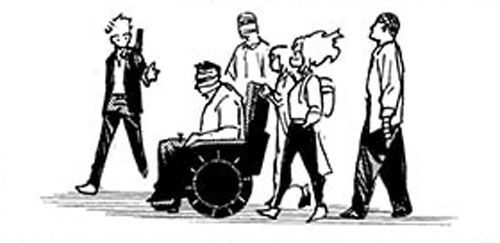
I guess I'll eventually get over it. Today though, it's not that day.
On a positive note... if we count the pages of all the chapters that should go in vol 42 they're only 132. The chapters that were meant to go into Vol 39 had 165 (which yes, Horikoshi further expanded once the volume was released).
So yeah, unless Vol 42 will be slimmer than usual or that he'll add to it some sidestory or extra story, it's possible we'll get more plot in terms of epilogue. We'll see.
(also yes, I'm not touching Rei in this post. Rei is another can of worm entirely and one, I fear, Horikoshi doesn't care about. The poor woman doesn't even get a profile while Ikoma Komari does. And really, I do think Rei is much more important than Ikoma Komari)
Last, but not least, since someone seems to get the wrong idea, in case it wasn't clear enough, I'm not Japanese. I research on this. Through books, through the net and yeah, since I like to read manga and anime also through them which I often use as a source of comparison because they're easy, accessible to many and represent the same kind of media BNHA is so they more or less move according to the same or similar rules. I might have messed up somewhere. I encourage you to also research on the topic and take everything with a grain or two of salt.
#boku no hero academia#bnha spoilers#Todoroki Enji#Todoroki Rei#Todoroki Touya#Todoroki Fuyumi#Todoroki Natsuo#Todoroki Shouto.#bnha ramblings#bnha meta
300 notes
·
View notes
Text
Why are there lycoris (spider lilies) in Naruhodo's hospital ward?
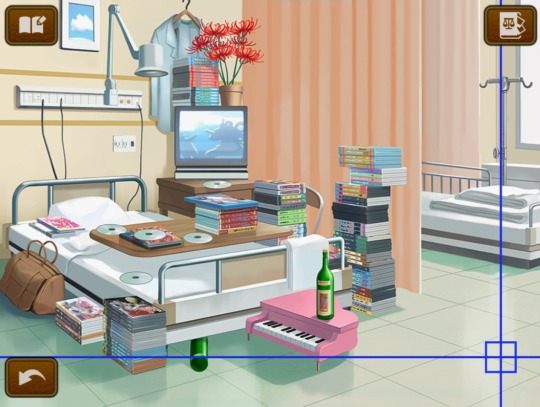
I think many of us were initially puzzled when we noticed this detail: why exactly these flowers, and in a hospital, and on a completely healthy person? Does someone wish him harm?
Not at all.
In fact, the history of lycoris, or higanbana as they are called in Japan, is not as ancient as it might seem, and the meanings and symbolism of these flowers have changed over the centuries.
Higanbana or Lycoris radiata is a bulbous plant from the lily family, common throughout Japan. It is believed that Higanbana was brought to Japan from Korea or China during the Muromachi period (室町 1333-1568) for its biological properties.
The Spider Lily’s strong association with death has led to its traditional planting in graveyards and temples. It is believed that the flower’s toxicity (its bulbs contain lycorine, a toxic alkaloid) helps deter animals from disturbing the resting places of the dead.
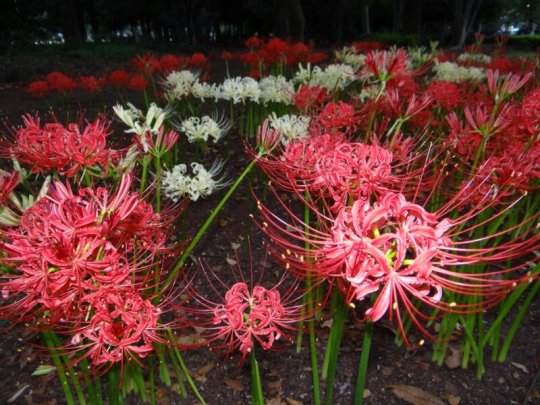
The flower’s name, “Higanbana,” translates to “flower of the afterlife” or “equinox flower,” reflecting its association with the autumnal equinox and the Buddhist festival of Higan.
Higan (彼岸, lit. "distant shore") is a Buddhist holiday exclusively celebrated by Japanese sects for seven days; three days before and after both the Spring equinox (shunbun) and Autumnal equinox (shūbun). During this time, Japanese people honor their ancestors, and the blooming of these flowers serves as a poignant reminder of the transient nature of life.
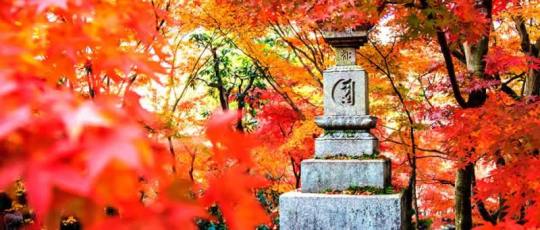
In Higan, various rituals are performed to help the soul overcome the path from the west, from the world of ��confusion and disorder”, to the east, into the world of “enlightenment”.
In Japan, there is a proverb: “Heat and cold end in Higan” (jp: 暑さ寒さも彼岸まで), which means the change of seasons.
Despite these somber associations, the spider lily is also a symbol of renewal and the cycle of life and death. During the Higan festival, the flower represents the passage from the physical world to the spiritual, reminding people to reflect on their lives and the lives of those who have passed on.
The spider lily is also linked to the concept of impermanence, a central tenet in Buddhism. The flower blooms suddenly and fades just as quickly, symbolizing the fleeting beauty of life. Its bright red color is often associated with blood and the idea of finality, further cementing its connection to death and the afterlife.
Spider Flower blooms carry a tapestry of meanings across cultures. Historically, they've been symbols of both invitation and solitude, suggesting a dual nature. In some traditions, they represent an open invitation to explore the unknown, while in others, they signify a desire for privacy and independence.
The Higanbana flower can also symbolize: sad memories, thinking only of you, looking forward to seeing you, reunion (gain), passion, independence (distancing), refusal (reconciliation), horror.
There are many myths and superstitions associated with the flower. It was believed that flowers have magical powers and can influence the fate of people: for example, if you hide a flower in the bed of a loved one, this can create an unbreakable attachment until death. Its flowers symbolize strong feelings and an eternal connection. Therefore, lycoris can be given to express deep affection, devotion, respect, as a sign of reverence.
Let's summarize.
Spider lily can mean:
1. symbol of renewal and the cycle of life and death
2. impermanence
3. idea of finality
4. invitation and solitude
5. looking forward to meeting you, thinking only of you
6. reunion (gain)
7. strong feelings and eternal connection
8. independence (distancing)
9. refusal (reconciliation)
In other words, these flowers literally symbolize the beginning of Naruhodo's path to returning to the legal world, to his "rebirth" as an innocent man. And the one who gave these flowers is looking forward to meeting and reuniting. Who could it be...
#ace attorney#gyakuten saiban#naruhodo ryuichi#phoenix wright#spider lily#higanbana#in the gks universe together with croq#i said what i said
78 notes
·
View notes
Text
Toman and Buddhism + Tenjiku and Taoism
Another post to cover references in Tokyo Revengers!
This time, I'll be covering the links to two religions to be found in two gangs in the series, reference by reference, with the according explanation of each.
Some of these may be already known, I know one of them sure is (the whole buddhist manji confusion thing yeah yeah) but still, for the sake of a tidy compilation and of providing more detail, I'll go through them too. Some others are a lot less noticed, like Tenjiku's lean towards Tao, so it'll be best to lay down eeeeeeverything I've caught during my time enjoying this series. Plus, I'm pretty excited to get some of those less-known facts out here!!
Warning though, it's lengthy.
Let's start with Tokyo Manji Gang:
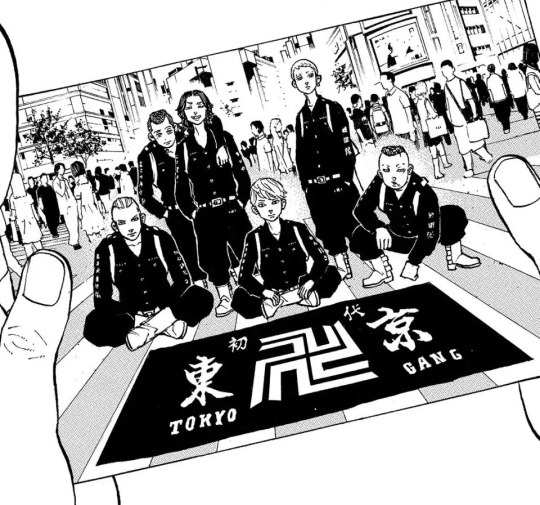
- Firstly, the gang's name and how it's written.
Despite Mikey suggesting the name as a short form of Tokyo Manjiro Gang, putting himself front and center, the kanji that ended up forming the name of Tokyo Manji Gang show that it went in a different direction of meaning. The manji used for the middle part ended up not being the same one from the name Manjiro, but a manji written as 卍. Aloud it's read the same way (many, many, many kanji are homophones), but has a different meaning.
卍 (manji) is an extremely common buddhist symbol (not even limited to japanese buddhism, but in hinduism and other aligned east-asian religions too), which represents the path of Buddha and the endless cycle of rebirth through samsara; the pursuit of leading a more spiritually balanced existence until the soul can reach enlightenment. In other words, it's nothing but deeply buddhist.
(To answer a common question around it: can it be called a swastika? Yes. The symbol in general, with each of the million variations that have popped up in different cultures, can be called a swastika as a broad term. There are a fuckton of swastikas. They mean a fuckton of different things. The tilt and the direction in which this one "spins" makes it different from other swastikas though, and it's always best to be precise and call this one manji.)
Moving on,
- Reunion spot.
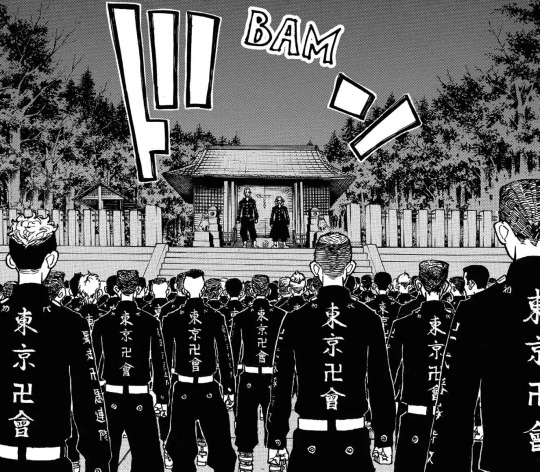

The Musashi Shrine (based, but not exactly taken from any of the real-life shrines and temples of similar name in Tokyo, as far as I know) is a shinto-buddhist temple. And, apparently, a place where the founders hung out from time to time, but I'll add to that later!!
It's cute to me that the Toman members seem to use the temple very respectfully. They always meet in it at night waaay after it's closed (daytime meetings have always taken place in different locations, never the temple during visiting hours), they've never once set foot even near the oratory/sanctum/other buildings, never been seen bringing the motorcycles anywhere they shouldn't, and the one time a character was seen using the public temizuya (the little stone fountain where visitors purify their hands and mouth), he was proper about it in terms of pouring water into his hand to rinse his mouth with, not getting the ladle or the rest of the water dirty, as one should always do.
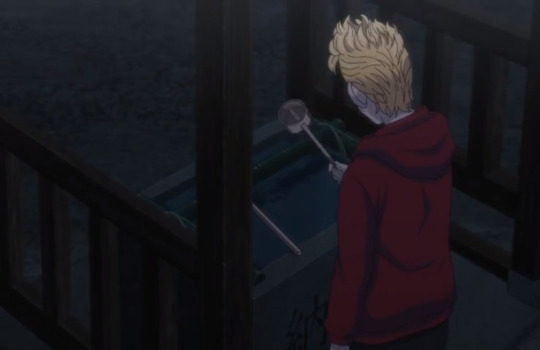
A fun fact: in Google Maps, buddhist temples are marked with the manji symbol!
- Gang's manifesto.

Embroidered on the chest of the gang uniform, you can see the text 天上天下唯我独尊 ("Above the earth and below the heavens, I alone shall be honored"), which is the gang's manifesto or motto. Sounds just like something Mikey would choose, yeah.
That phrase is also of buddhist origin; famously, the words spoken by Buddha Gautama Siddharta (bear in mind that buddhism isn't a religion with one god or anything like that, anyone enlightened can become a Buddha and many figures have been granted that status, but Gautama is the first and main one, the creator of the doctrine) when he was born. To be honest, this is very much interpretative, but I've come to get the impression that it's not so much a power or ego statement, but rather an expression of cultivating and honoring yourself…? It's absolutely up to personal reading and I'm absolutely not an expert. But those are certainly THE Buddha's words.
- Ceremonial sash.
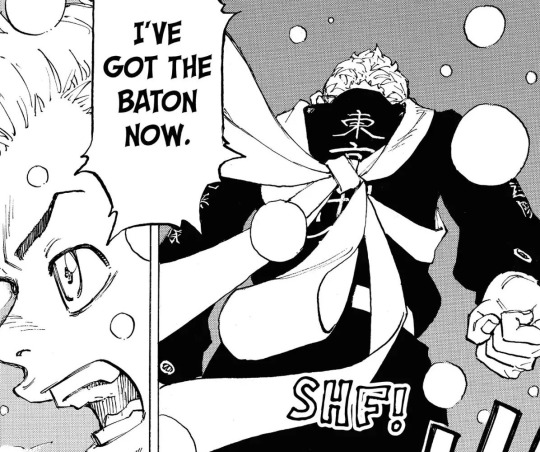
Another part of their uniform that bears a slight reference: the sash worn by the commander, vice-commander, captains and vice-captains during important fights.
These are tasuki, sashes originally worn by shinto-buddhist priests during ceremonies, in order to keep long sleeves and such in place. However, eventually, they also began being worn by samurai and all sorts of warriors, 'cause of their convenience. In modern times, they even started being used by just about anybody who wears traditional clothing but also does manual work and needs the sleeves out of the way. So it can be concluded that, over time, they stopped being strongly linked to religious practicers. In fact, even biker gangs in general ended up adopting the use of tasuki! Not for their religious origins, but for the warrior part; a bōsōzoku gang member wearing one would look very prepared and determined for a fight.
That's why overall, Tokyo Manji Gang having them is only a relative reference; they could be paying homage to their reference religion, as they could be only honoring gang traditions.
- Additional notes about the leader.
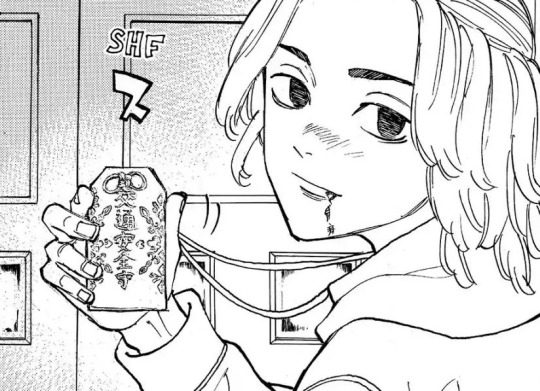
I feel it's important to add up all these little factors of Mikey's choosing, with other little details about him as a person that kinda make it all make sense.
If I say "Mikey seems to be religious, to an extent", I understand this can carry a bunch of tricky connotations. Japanese religion isn't exercised the same way it is in other places, someone being religious SURE AS HECK doesn't mean the same things it means in the christian west. Shinto-buddhism is so commonplace in Japan, most people partake in all kinds of religious practices without even thinking of them as strictly religious, such as new year's celebrations, casual prayer during shrine visits, purchasing and giving charms and such. Religion is integrated in life in a lot of extremely chill ways.
And we can observe a lot of things about Mikey that put him quite above the average in terms of his relationship with local tradition and religion. His house is a huge traditional-style family home, his family is hinted to be active in religious practice (remember Emma's appearances during the Christmas Showdown arc? How she mentioned that their family does a lot of temple visits, and even she considered it weird at that time of the year?), he's much more prone to wearing traditional clothing than his peers, his motif in extra clothing designs is the lion-dog (temple guardians; statues of these can often be found in them), his personal beliefs around death and relationship to the dead run deeper than others' to the point they find him disturbing when he talks about Shinichiro or Baji still being with him... many little things that aren't that deep on their own, of course, but when added up they paint a pretty coherent picture of the guy.
And so, it does make a lot of sense that, even from childhood, a temple was a regular place for Mikey to hang out with his friends, leading to the birth of Toman in one. And it makes a lot of sense that he made all those little choices about the way the gang would be styled. In my opinion, it's likely that those things just all came natural to him because they're a part of his background and worldview. Of course, how actively religious he is, how much he believes in the things he happens to know and how much exactly he might know about buddhism are all up to headcanoning and interpretation. Personally, I'm just a roleplayer that takes it as a relevant part of his character.
- Following a Buddha?
A little out-of-TR-universe element that I love to bring up, 'cause it's just hilarious and cool as hell, is the creation of this statue:
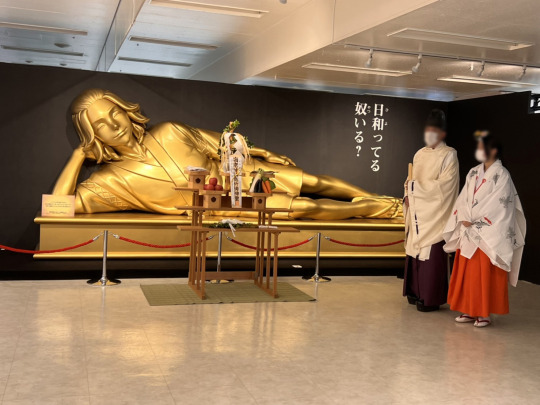
This part of the 2022 Tokyo Revengers exhibition straight up imitates the famous Reclining Buddha in the Wat Pho temple, Thailand.
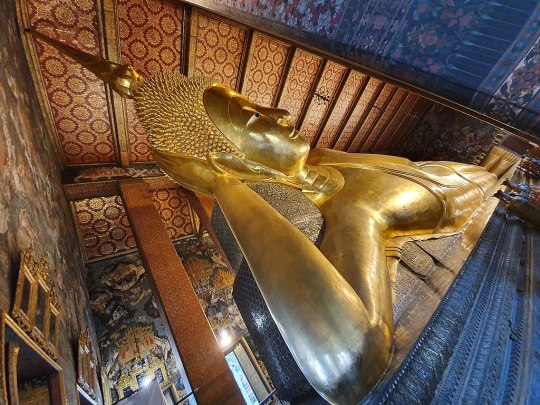
The ENORMOUS statue depicts the moment Buddha reaches nirvana, and his enlightened soul is at rest. The golden Mikey statue that imitates it very much intentionally likens him to a Buddha; funny to note that the exhibition staff even prayed to the statue, as you can read in the tweet itself.
What does this mean about Mikey's character? Well, this isn't within text in Tokyo Revengers, just a little outside factor, so I wouldn't take it too literally or too seriously, but it's interesting nonetheless. Personally, I see it as a hint that Mikey was supposed to be on his own little quest to enlightenment, or had the potential to be. Grappling with morality without having a natural sense of what's right, wrong, too much or enough is a major thing with his character. I can also imagine it might just be meant to represent the godlike view others have of him, the guidance they sought from him. Take it as you will!
The important thing is just that it exists, to confirm that there is an intentional connection of some type between the Buddha and Mikey.
Thaaaaat concludes the Toman and Buddhism section of this post.
Whew!! That was a whole lot.
The Tenjiku and Taoism section coming now is shorter, but I'm sure it contains interesting and less-known things (at least, I've never seen anybody talk about these)!
So let's see, Tao references in Tenjiku:

- Gang name.
Tenjiku is a now-obsolete word that translated directly to "heaven", while simultaneously being the japanese word for the country India (as taken from the chinese pronunciation, Tianzhu).
In modern times, it can be found mostly in ancient literature, the most prominent example being Journey to the West. Given that Kakucho and Izana mentioned this book and seemed to have knowledge of it as kids, we can conclude that's where they got the name of their gang from.
Why would they use the word for India to name their kingdom? What does this have to do with Tao? I'll get into that properly now:
- Kakucho, Izana & Journey to the West.

Journey to the West is one of the four great chinese classic novels (along with Romance of the Three Kingdoms, Outlaws of the Marsh, and Dream of the Red Chamber) which are enormous, ENORMOUS influences on east-asian literature and fiction in general. Journey to the West, itself, is considered the most popular east-asian literary work overall; of course, being super well-known in Japan, too. (To give my favorite funny example of just how omnipresent it is, y'know Dragon Ball? Hit anime series Dragon Ball? Unabashedly based on Journey to the West, which was to thank for most of its initial local popularity.)
It's the story of the buddhist monk Tang Sanzang, who travels to Tenjiku, to India, to that certain heavenly kingdom, to obtain sacred texts for Buddha Gautama Siddharta (the guy I described as THE Buddha in the Tokyo Manji Gang section above). The quest doubles as a search and exercise of enlightenment, as Tang Sanzang is aided by three protectors that are atoning for their sins and learning from him. The main guardian and arguably the true protagonist of the book is Sun Wukong, the Monkey King, a fighter "so strong he could carry a mountain on each shoulder, and still dash as fast as a meteor". It's a huge, epic, 100-chapter monster of a book, in which each chapter is already a fantastic and entertaining anecdote about the characters or what happens in their travels, but also a long spiritual journey that pretty much serves to subtly teach the principles of Tao (term that can be translated to "the path", chinese religion and philosophy).
A tangent: let me just show you how large it is (and why I haven't been able to finish it, 'cause I cannot take this brick of a book anywhere lmaoooo).
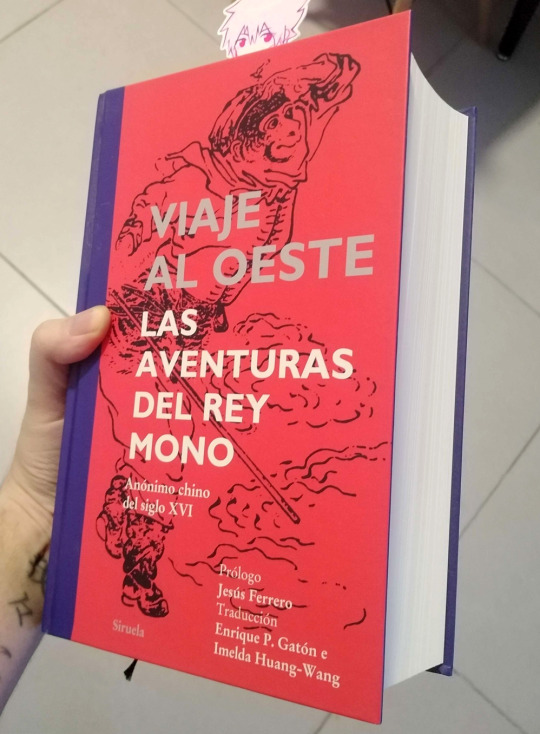
(Cover says Journey to the West: The Adventures of the Monkey King. It's in spanish.)
My guess is that Izana and Kakucho studied about it or read some chapters in school, 'cause dang, there's no way they read all of this at that age?!?! BUT ANYWAY.
While there's obviously quite some buddhist influence in the story, most of what it works with throughout is rooted in chinese folklore and Taoism. The edition of the book I have even begins with extensive notes and introductory explanations about Tao, as its themes of harmony with the universe, self-cultivation, internal alchemy, its main ethics and values, etc etc etc are the basis from which the book is built up. The characters very actively engage with Tao. Sun Wukong is an ardent student of Tao who obtains a bunch of powers through it, for one.
I've gone into this much into detail because Kakucho and Izana make it pretty explicit that, to them, Izana is like monk Tang Sanzang leading to Tenjiku, and Kakucho is like his guardian of unmatched strength, Sun Wukong.
In the end of Journey to the West, it's both Tang Sanzang and Sun Wukong that accomplish their goal and also obtain enlightenment, finally ascending to buddhahood. Had Izana and Kakucho's journey with Tenjiku reached their original destination (not "to become a criminal syndicate that controls Japan" but "to build a kingdom where everyone without a home could exist"), had it been like Tang Sanzang and Sun Wukong's pilgrimage… they would've learned true balance and they would've found the necessary enlightenment.
Again, I find this little connection with characters that could've been on a quest towards buddhahood, but as far as things went in the main TR timelines, all failed.
- Uniform & logo.
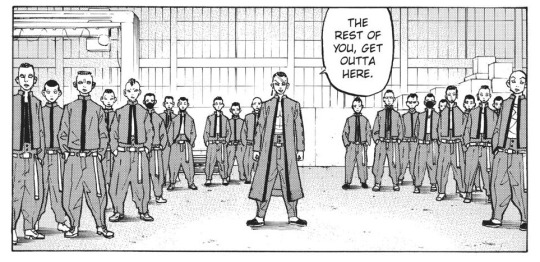
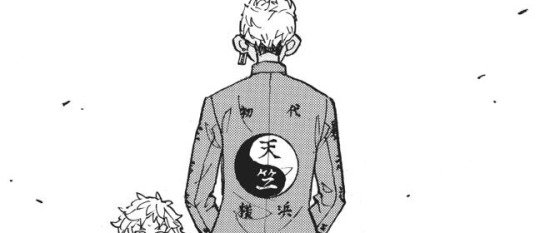
Finally, something lighter and quicker to add, haha.
There are symbols and references that are so so so widespread that they become more of an aesthetic detail than a symbol with meaning, in the eyes of the general public. The yin-yang is one of those symbols that just… appears in a lot of places, fashionably, and one kinda gets used to seeing it without thinking much about it. Sometimes it's not meant to stand for much more than a decorative detail, yes, that definitely happens, but sometimes it's very much a thoughtful choice. With Tenjiku, given its connection to Taoism, I'm gonna treat the yin-yang as a meaningful choice.
So! On the back of the uniform we have a yin-yang, Taoist symbol that represents the balance of the two complementary and opposing forces of the universe (note: it's not a good vs evil type of thing, as tends to happen with western black-white dualism, but rather… the fact that reality needs to be composed of push and pull to get anywhere, hard and soft things with their own function, sun and shade. A common comparison is how a mountain will have a sunny side and a shady side when looked at in a certain moment, but the sun and shade will switch over at another time of day, in a needed cycle). Other features of the uniform are a mao collar instead of a more common style for gang jackets, and an intense red color, the main auspicious and prosperous color in chinese culture. These last two little features could easily be coincidental, but when paired with the yin-yang, I feel like it's intended to lean towards chinese aesthetics.
And with that,
I end this reference post!
Did you learn anything you didn't know? Did you enjoy learning it? Any thoughts? I LOVE TO TALK ABOUT THESE THINGS, SO FEEL FREE TO DROP BY MY ASKBOX with any comments or questions or such!!
#tokyo revengers#tokyo revengers meta#tokyo manji gang#toman#tenjiku#kurokawa izana#sano manjiro#izana kurokawa#manjiro sano#mikey#kakucho#thoughts and talk and so#tokyo rev#wanted to write this one forever#just never quite got around to it
201 notes
·
View notes
Note
hey, just wanted to say that i appreciate you creating this space to discuss more uh....unpopular takes on star wars. obviously fandom is a hobby and i don't want to ruin anyone's fun! but i also want a space to push back against fanon interpretations without treading on anyone's toes, you know?
like the whole obi-wan catholic guilt trope, jedi repression trope at large...i'm being dramatic but as an asian person, sometimes it sucks that this is such a prevalent idea about a heroic group that was influenced by buddhism and is very asian-coded. i'm not wording this well but just like how stories about european knights often reflect *the very best* of western values like chivalry, honor, gentility, i could really see a lot of the best of asian culture (a huge over-simplification) in the jedi.
but all that being reduced to "oh actually it's totally catholic guilt" or a inadvertently a regurgitation of prevalent asian stereotypes (the jedi as a group suppress individuality, they don't express emotions, they are too harsh, too unforgiving, lack compassion) is...frustrating to see, even though it's everyone's right to interpret & relate to things as they see fit.
especially when focused on obi-wan! even if we assume that obi-wan is repressed, secretly attached to an unhealthy degree but hiding it, or whatnot - the man quite literally airs the dirty laundry in front of mace and yoda, perhaps the "highest" members of the jedi. he says that he thinks anakin is arrogant, isn't listening to him. i dunno but a repressed person who hates confrontation and vulnerability probably wouldn't do that. he should've gone "haha nope anakin and i are totally fine masters, totally fine" instead of looking for advice & airing out his frustrations.
people getting angry at obi-wan for putting the jedi order over anakin is still annoying, but at least accurate. like yes! obi-wan does put the good of his culture and the galaxy at large over his old padawan! good for him!
but honestly all popular fanon obi-wan tropes go round on a roulette wheel waiting for me to pick one to be petty about lmao.
I definitely get what you mean about wanting a space to push back on common fanon interpretations without stepping on anyone's toes. That's obviously exactly why I made this blog in the first place. It's why I named the blog "antianakin" at all, it's supposed to be a giant neon warning sign to people that I'm not going to feel ashamed of some of my more negative opinions. It's why I use anti and critical tags as much as possible, and don't use the more general tags most of the time (aside from just... "star wars"). This is my space to put my feelings out there, positive AND negative, and I work really hard to make sure I'm not invading spaces that are meant for being positive.
I also often don't reblog people's posts that I completely disagree with JUST to talk about why I don't like their take. I won't invade someone's Jedi critical post in order to tell them that they're wrong about Star Wars. People have tried to tag me into posts like that, but I'm not interested in doing that kind of thing. If I DO want to say something about what I've seen, I make my own post about the issue.
It's interesting that you mention that stories about European knights often reflect what's viewed as the best of Western values, because so often when I see people talk about what would make the Jedi BETTER (or Legends versions of the Jedi that they think were done better), it's usually pretty clear that the Jedi are being turned INTO your more typical European knight to reflect those exact values. They're often wandering on their own, doing what they personally believe to be right whenever and wherever they want, defending the helpless wherever they find them by just riding in on a white horse and slaying an enemy or a monster. And of course some of those values they uphold are about what love and relationships should look like, too, so they all end up in committed monogamous relationships (even if it's with more than one person, it's still usually monogamous). This is one of the reasons I started getting frustrated with the High Republic novels by the third one because it started having that vibe that the "good" Jedi who stuck to more "traditional" ways of doing things and "traditional" values were so much more like your typical European knight, while the Jedi character doing something more modern and more political was losing his way and struggling with a desire for things he was repressing.
It's a feeling we've seen come up time and time again and it keeps getting tossed out in more recent shows, too, the idea that the Jedi "lost their way" from what they should've been, that they once used to represent something worthwhile and losing those traditional values is what caused their destruction and the only way to keep it from happening again is to go back to that. It's not hard to see where that storyline feels compelling, obviously, but it IS sad to see the values that the Jedi DO have in the Prequels in particular getting tossed aside as unworthy and to see their defeat being rewritten as THEIR failure instead of everyone else's.
I've had people tell me that this story feels like it has more nuance to it than the Jedi simply being the heroic victims and the Sith being pure villains. And I get why people think that, I just think that there's a lot of nuance they're MISSING in the story being told, and that that nuance exists EVEN WITH the Jedi still being the heroic victims and the Sith being clear villains. I am more than happy to help critique some of the WAYS that that story got told in the Prequels, the issues in the structure of the Prequels and how it maybe muddied some of the messages that the story was trying to get across, but I also think that that critique is SEPARATE from my feelings on the intended narrative itself. I don't think that the narrative itself is bad or lacking in nuance simply because it may not have been told perfectly. And, personally, I think that some of the more "nuanced" Jedi critical takes often seem INCREDIBLY simplistic themselves.
As for Obi-Wan, fandom will do what fandom does to its darlings. I've certainly done my fair share of simplifying my faves down to shadows of themselves because I happened to enjoy the shadow sometimes in its own right. But I do think that there's plenty of evidence to contradict a lot of people's more popular interpretation of Obi-Wan as a repressed, damaged, traumatized waif. I don't mind a LITTLE of that sometimes, usually when I read fics set in the early years of his apprenticeship with Qui-Gon following some of the events of Jedi Apprentice, but it comes with the context that Obi-Wan is still VERY YOUNG at the time and is dealing with some fairly specific things that have just happened to him and is still learning how to do that in a healthy way.
By the time you hit The Phantom Menace and ESPECIALLY the Clone Wars, Obi-Wan should no longer be a repressed, traumatized waif of a person. That's when it stops being believable to me because the character we see on screen in that time period never fits that description. Like you said, he's ACTIVELY confrontational to his superiors. He does do it with Mace and Yoda (and he does it in ROTS as well as in AOTC) and he does it with Qui-Gon during his apprenticeship, too.
The one other time I was willing to accept some of this characterization was in the Kenobi show where we do see him being more repressed and traumatized and less willing to stand up for himself when faced with confrontation with people like Owen. But one of the reasons this worked for me is because, much like with those JA fics, it comes with a VERY SPECIFIC CONTEXT, and it's done with the intentional purpose of giving Obi-Wan somewhere to develop. He also doesn't stay particularly submissive or waif-like for long, we see him gain back a LOT of his willingness to stand up for himself and confront people by the second episode. The message wasn't that Obi-Wan had ALWAYS been damaged and traumatized or that he was always "meant" for sadness or whatever, but that he had the capacity to find happiness IF HE CHOOSES TO ACT LIKE THE JEDI HE ONE WAS. The only reason he's struggling is because he ISN'T acting like a Jedi anymore. He's not finally figuring out how to handle his traumas, he's GOING BACK to being the person who can handle his traumas.
Anyway, yeah, I feel you, I have definitely experienced the roulette wheel of petty frustration at fandom interpretations of Obi-Wan lol. I can barely handle the "he drops his lightsaber all the time" joke because I feel like it often makes him come across as childishly incompetent.
60 notes
·
View notes
Note
can i request any words/ phrases/ themes linking to the word ‘relic’?
Writing Notes: Relic

Relic - an object esteemed and venerated because of association with a saint or martyr; souvenir, memento
Relics - remains, corpse; a survivor or remnant left after decay, disintegration, or disappearance; a trace of some past or outmoded practice, custom, or belief
Reliquaries - the containers that store and display relics
Where the bones of martyrs are buried, devils flee as from fire and unbearable torture. —St John Chrysostom
Etymology
Middle English relik, from Anglo-French relike, from Medieval Latin reliquia, from Late Latin reliquiae, plural, "remains of a martyr", from Latin, "remains", from relinquere "to leave behind"
Related Words
Afterimage - a lasting memory or mental image of something
Artifact - an object remaining from a particular period
Corpus - the body of a human or animal especially when dead
Decedent - a person who is no longer living; a deceased person
Memento - souvenir
Oddment - something left over; remnant
Oeuvre - a substantial body of work constituting the lifework of a writer, an artist, or a composer
Remnant - a usually small part, member, or trace remaining
Souvenir - something kept as a reminder (as of a place one has visited)
Vestige - a trace, mark, or visible sign left by something (such as an ancient city or a condition or practice) vanished or lost
Martin Luther complained about the profusion of relics and the absurd claims being made for them: "What lies there are about relics! One claims to have a feather from the wing of the angel Gabriel, and the bishop of Mainz has a flame from Moses’ burning bush. And how does it happen that eighteen apostles are buried in Germany when Christ had only twelve?"
Examples
ANCIENT GREEK RELICS. At Athens the supposed remains of Oedipus and Theseus enjoyed an honor that is very difficult to distinguish from a religious cult.
BUDDHIST RELICS. Relics of the Buddha and various saints were (and still are) venerated. Following the Buddha's death, his bones and teeth were divided for the purpose of being used as relics in order to illustrate his teaching of impermanence (anitya). These relics were so valued that they caused armed conflict between factions for possession of them. Afterward, these relics were taken throughout Asia with the gradual spread of Buddhism.
CHRISTIAN RELICS. Since the dawn of Christianity, relics have been an important part of Christian devotionalism. During the Middle Ages, the selling of relics became a lucrative business. The concept of physical proximity to the “holy” was considered extremely important. A pilgrim's possession and veneration of a relic was seen as a means to become closer to God. Instead of having to travel hundreds of miles to become near to a venerated saint, a Christian could enjoy closeness with him/her through their relic at home.
MUSLIM RELICS. Although certain sects of Islam strongly discourage (or outwardly prohibit) the veneration of relics, a very large collection of Muslim relics is preserved in the Sacred Trusts, located in Istanbul, which contains more than 600 treasured pieces in the Topkapi Palace Museum.
The Roman Catholic Church makes a distinction between veneration and worship of relics and icons.
3 Categories of Relics According to the Vatican
First-Class Relics: Items directly associated with the events of Christ's life (manger, cross, etc.), or the physical remains of a saint (a bone, a hair, a limb, etc.).
Second-Class Relics: An item that the saint wore (e.g., sock, shirt, glove). Also included are items that the saint owned or frequently used (e.g., a crucifix, book). An item more important in the saint's life is considered a more important relic.
Third-Class Relics: Anything that has touched a first- or second-class relic of a saint.
Sources: 1 2 3 4 5 6 7 ⚜ Writing Notes & References
Hope this helps! Do tag me or send me a link to your writing if it does. I'd love to read your work.
#anonymous#writing notes#relics#writeblr#spilled ink#dark academia#writing reference#writers on tumblr#writing prompt#poets on tumblr#literature#poetry#religion#creative writing#writing inspo#writing ideas#writing inspiration#writing resources#langblr#linguistics#words#history
71 notes
·
View notes
Text
[Traditional Chinese Festival] Customs of 臘八節(Laba Festival) in China.Eng Sub
Today(January 18, 2024) is the traditional Chinese festival,臘八節 Laba Festival.Let’s learn about some interesting traditions and customs about this festival.
【About 臘八節(Laba Festival)】
Laba Festival (Chinese:臘八節) is a traditional Chinese holiday celebrated on the eighth day of the month of La (or Layue 臘月), the twelfth month of the Chinese calendar. It is the beginning of the Chinese New Year period. It is customary on this day to eat Laba congee.
Laba Festival was not on a fixed day until the Southern and Northern dynasties, when it was influenced by Buddhism and was fixed on the eighth day of twelfth month, which was also the enlightenment day of the Buddha. Therefore, many customs of the Laba Festival are related to Buddhism.
The Laba Festival's name represents its date on the Chinese calendar. La is the name of the twelfth and final month, and ba means "eight/八". In ancient China, the "eight/八" referred to making sacrifices to eight gods at the end of the year.
In its original form, the festival was celebrated by making sacrifices to gods and ancestors to wish for good fortune, health, safety, and a good harvest in the new year. The word la originally referred to these sacrifices.
After Buddhism spread to China during the first century CE, the festival was used as commemoration of Gautama Buddha's enlightenment.It was given a fixed date (the eighth day of the twelfth month) during the Northern and Southern dynasties.
【Customs of 臘八節/Laba Festival?】
Laba congee/臘八粥
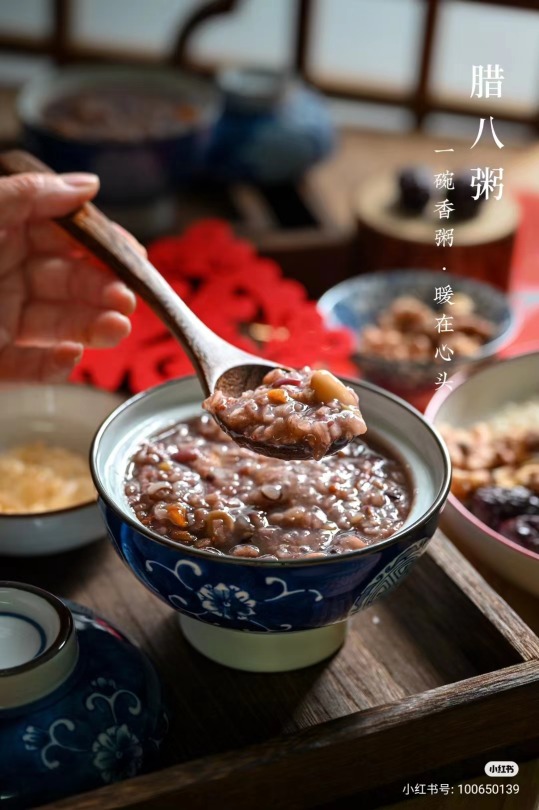
Traditionally, the consumption of Laba congee is an important element of the festival. There are multiple legendary accounts of the dish's origins. One story says that it originated in the Song dynasty with Buddhist monasteries giving congee to people in honor of the story that Sakyamuni (Gautama Buddha) reached enlightenment on the eighth day of the twelfth month after eating congee.
Laba congee or Laba porridge (臘八粥; Làbāzhōu) is very popular in many places in China. Different kinds of rice, beans, nuts and dried fruits are the main ingredients. People believe that it's good for health in the winter.
It is also known as "eight-treasure congee" (八宝粥; Bā bǎo zhōu)and is usually made with eight or more ingredients, representing good luck. Eight is a lucky number in China, and the ba in Laba also means eight.
There are many variations of Laba congee in different regions of China. Ingredients can include mixed grains, such as rice, millet, and barley; beans and nuts such as mung beans, azuki beans, lotus seeds, peanuts, walnuts, and chestnuts; dried fruit such as red dates, longan, raisins, and goji berries; and other ingredients such as vegetables and meat.
2.Laba garlic/臘八蒜

Another Laba food is Laba garlic, which is particularly popular in northern China.Garlic in Chinese (蒜; suàn) has the same pronunciation as calculate (算; suàn), and it is said that on the Laba Festival businesses should balance their books and calculate their revenues and expenditures for the year.Laba garlic is made by soaking garlic in vinegar. Laba garlic is soaked in vinegar from the Laba Festival until Chinese New Year. The garlic and vinegar are then used alongside Chinese dumplings (jiaozi) around Chinese New Year.
————————
🧚🏻Model/Makeup:@曾嚼子&@兔狲猫眠眠
📸 Photo:@逸群闲余
🔗 Xiaohongshu:http://xhslink.com/zlF8Hz
————————
#chinese hanfu#hanfu#Traditional Chinese Festival#臘八節 Laba Festival#chinese culture#chinese customs#chinese history#hanfu accessories#chinese food#china#chinese new year#song dynasty
204 notes
·
View notes
Text
Dead Friend Forever - DFF (2023)
เพื่อนตาย (the series name in Thai) means best friend, true friend, real friend, faithful friend, but it consists of the words 'friend (เพื่อน)' and 'dead/die (ตาย)'.

Phi พี
Ratthakiat Phromjinda รัฐเกียรติ พรหมจินดา
Phi-meaty, plump, fat (positive meaning) or it might be shortened from something, or maybe a letter P.
Rat- state, country, nation, territory, realm, kingdom, land
Tha-a sound that put in to help link two words(Rat and Kiat) together.
Kiat- prestige, honour, honor, glory, reputation, dignity, fame
Phrom-Brahma
Jinda-precious stone, gem
Jin จิน
Jinnaphat Sukmek จิณณภัทร สุขเมฆ
Jin-This (จิน) spelling has no meaning in Thai. It might just be a simplified spelling of his legal name's first syllable(จิณ).or maybe it means to represent a word from other language. idk
Jin (จิณ)-Well behaved, one who behaved well
na-a sound that put in to help link two words together.
phat-good, prosperous, excellent
Suk-happy, happiness, joy
Mek-cloud
Tee ตี๋
Pariphat Wanit ปริพัฒน์ วาณิชย์
Tee-Chinese boy
Pariphat-Prosperous in every way
Wanit-Commerce, trade, business
White ไวท์
Watcharin Siriphan วัชรินทร์ ศิริพันธ์
White-Not a Thai word
Watcharin-Lord of Diamonds/Thunder (refer to Lord Indra)
Siri-splendor, glory
phan-binding, related, bound
Tan แทน
Siriwat Phatthanon ศิริวัฒน์ พัฒนานนท์
Tan-represent, stand for, substitute, replace, take the place of, substitute for, supplant, supercede, show gratitude to, repay(meaning dependent on the context)
Siriwat-prosperous
Phatthanon-rejoice in prosperity
Fluke ฟลุ้ค
Phakhin Thianthong ภาคิน เทียนทอง
Fluke-Not a Thai word
Phakhin-lucky person
Thianthong-gold candle, name of a plant (Duranta erecta L)
Top ท้อป
Sirawit Wibulsilp สิรวิชญ์ วิบูลย์ศิลป์
Top-Not a Thai word
Sirawit-The greatest philosopher
Wibul-big, spacious, many, full, complete
Silp-art
Por ปอ
Prachaya Suwannarat ปราชญา สุวรรณรัตน์
Por-jute, hemp, dragonfly
Prachaya-wit
Suwan-gold
Na-a sound that put in to help link Suwan and Rat together.
Rat-gem, precious stone. Might be refer to The Three Jewels of Buddhism (just my opinion)
Non นนท์
Thanakorn Prathipsit ธนกร ประทีปสิทธิ์
Non-pleasure, delight, enjoyment, happiness, joy, contentment, satisfaction
Thanakorn-Create wealth/assets
Prathip-lamp, lantern, light, torch
Sit-right, authority, privilege, ownership, possibility
Keng เก่ง
Ratchanon Kijkarun รัชชานนท์ กิจการุณย์
Keng-excellently, expertly, proficiently, skilfully, brilliantly, good at
Ratchanon-rejoice in treasure
Kij-affair, activity, work, business, operation, duty
Karun- kindliness, compassion, pity, mercy, gracefulness, benevolence, kindheartedness, beneficent
If you look closely, you may notice that some words in the names and surnames of each character are repeated.
The meanings of some of them are pretty similar too.
Not that it's weird.
I just feel like it is a little more than usual. But it isn't exactly like they are a set with an intended theme?? It's just that some of the words they use are kind of in the same group in my head????
Index
114 notes
·
View notes
Note
What's your opinion on the kind of satanism that's used as like an antitheism thing? Like the more atheist "I don't believe in the devil, but I believe in what he stands for" (like freedom etc)
Hi, 'Nonny! Thanks for the question.
Soo, I'm a thiest, right? (Albeit a skeptical one, believe it or not!)
SO: I don't agree with antitheism. I believe everyone has a right to believe what they will: as long as they aren't hurting anyone, or using their beliefs to oppress, abuse, or stigmatize others.
Satan Himself--however you interpret Him--is a fascinating figure. Right?
I mean, look at the impact He's had on culture! Someone Who had historically been viewed as the embodiment of evil has been flipped around into a symbol of empowerment, freedom. Hope. I think that's beautiful!
Circling back to your question:
Honestly?
I don't care what other people believe.
I don't believe humanity has "One, True Path;" but that we each have unique, individual paths.
Now, that path might be atheism, or agnosticism. Satanism, atheistic Satanism. Buddhism. Christianity!
And your path might change. And that's normal, and okay.
What I don't agree with (it always gets my goat...pun intended) is the erasure and demonization (for lack of a better word) of theistic Satanism.
From the people who say,
"Oh, Satanists don't actually believe in Satan!"
To atheistic Satanists who present themselves with an air of superiority; as if they are the "one, TRUE" Satanists.
BUT isn't that just...
the antithesis of Satanism? Of what Satan stands for?
Individuality?
Freedom?
Honoring yourself?
Your path?
Boxing others in isn't freedom.
In other words?
Find what's right for you.
But don't trample other people in the process.
-🥀-
May you find peace in your path.
I believe in you.
🖤 Brenda
#ask me anything#ask#gentle gnosis#satanism#theistic satanism#satan#devil#the devil#freedom#anon ask#anon#anonymous#🤍
8 notes
·
View notes
Note
talk to me more about hotaru and his relationship w the rabbit in the moon :|
Ask me Hotaru questions ; accepting !
Thinking about how I want to answer this. So basically Hotaru is the rabbit on the moon. The version of the story that I am most familiar with is the one where a rabbit, monkey, and… third animal are traveling where they come across a starving old man.
The two other animals succeed in fishing and foraging, but the rabbit is ineffectual in finding anything of sustenance for the man. As they stoke the flames to cook what they’ve fetched for him, the rabbit throws itself into the roiling flames so the old man can eat it for sustenance. The old man, touched by its sacrifice, reveals his true form as a god and honors the rabbit’s compassion by putting it on the moon so everyone will remember its sacrifice. And the moon is dark because of the smoke from the rabbit that still burns.
Hotaru is that rabbit. The thing about Hotaru is that he is a martyr and he is a saintly. There isn’t quite the same concepts of saints in Japan and in Shintoism and Buddhism. So a lot of the saintly imagery for Hotaru is definitely framed through a more Western lens but if we can have all of Evangelion I’m allowed to do this. Anyways!
The thing about Hotaru, to reiterate, is that he is intended to be a martyr. The thing about a martyr is that they need to die for something else and they need to see the something else as more valuable than them. Hotaru is this case. Like the rabbit, he puts the lives of others before his own. He hasn’t done it on the narrative of this blog, but Hotaru has and will take dangerous hits for loved ones because he knows that he’ll regenerate. But the thing about that is he still feels pain and fear and yet he’ll accept it anyways because he’d rather that than they get hurt and the effects be permanent.
Hotaru’s curse also gives him flesh and blood which empowers yokai when they feed from him. It gives them a temporary burst of strength but also expedites their healing. Hotaru is quite literally a meal in the way that the moon rabbit was. They are. The same.
And the moon rabbit is a prey animal. All it could be was prey. The monkey wasn’t prey, the monkey was a predator, so it didn’t think to put itself in the soup. But I wonder about that little rabbit, the horror of it, to know that you’re so ineffectual that you’re best served as a meal, that you were born to be consumed. And that’s Hotaru too, a prey animal to be consumed, but Hotaru has been consumed in every sense of the word.
He is a product as a host, and he is food for yokai. In a way, like the rabbit he was born to be victimized and had to find strength through this condition.
But I think back to my martyr point, this idea of dying for something else… dying because you value something more than yourself, that it doesn’t matter if you’re small and afraid because you believe in this…. You believe in dying for this.
The thing about Hotaru is that he is deceptively compassionate. It’s hard to tell in some of his threads, but if he recognizes pain in someone, then he eases off the gas. Insults them less, is more mindful of his behavior. It slides a bit depending on how agreeable the other person is, but Hotaru is very observant of people and their needs. Host habit perhaps.
But it’s more than that, it’s just him. He reassures customers who are nervous, he remembers their likes and dislikes, he commits their faces to memory, he helps old ladies cross the street, he’ll stop and help someone who needs it. He is very compassionate but he obfuscates it beneath 12 layers of cynicism. But that’s the thing, he’d sacrifice himself in a heartbeat like that rabbit.
Even if he’s prey, even if he’s afraid, even if he’s ineffectual and doesn’t have a fraction of the strength of a Janitor.
I feel like this got away from me, but saint rabbit Hotaru is real and intentional.
Hotaru is the patron saint of the rabbits you skin into your stew and the moon is his halo. He smells like smoke and incense and he’ll wipe the blood from under your lips while ignoring his own wounds.
4 notes
·
View notes
Text
The Yaudheya - who, what? They were an ancient military people based in the Eastern Regions of the Sapta Sindhu - a copper coin of theirs here depicting the Hindu War God Kartikeya (who is also a war god under other names via Buddhism spreading his story Eastward most commonly as Skanda, and in China, as Wei Tuo -- Skanda serves as a celestial guardian role here).


The word Yaudheya comes from Brahmi script (a script you'll see two iterations of/nods to in Tales of Tremaine by name).
Their name comes from the word Yodha - which means warrior/s. And this is backed up by their resistance of invasions by the Kushan Empire, and the Indo-Scythians. The Yaudheya would eventually claim dominion over all the Kuru Kingdoms held and then they themselves would become later absorbed into the Maurya Empire by Chandragupta Maurya. Eventually, the Indo Greek Kingdom Yavana would capture a majority of this empire, but fail to subdue to Yaudheya, who would successfully triumph until eventually losing to to the Indo Scythian Rudradaman I.
But the Yaudheya left an impression on the ruler that led to the inscription of a Sanskrit in prose (not poetry) honoring them as proud heroes - it is known as the Junagadh rock inscription of Rudradaman - dated at 150 CE (common era)
#Yaudheya#ancient military#Sapta Sindhu#Kartikeya#Buddhism#Skanda#Wei Tuo#Brahmi#Tales of Tremaine#Yodha#Kushan Empire#Kuru Kingdoms#Maurya Empire#Chandragupta Maurya#Yavana#Sanskrit#Rudradaman#ancient history#little known history#who and what#learn something new#this is interesting#ancient people#ancient world#world history#southeast asia#Asian history#Indo Greek#indo european
2 notes
·
View notes
Text
" i alone am the honored one " - when satoru stated this it was very clearly referential to a story which attributes these words to the shakyamuni buddha when he was born. as far as i can tell, this is predominantly from the mahayana tradition - specifically with ties to thien/chan/zen school of buddhsim. below is generally the context described for this quote.
he immediately took seven steps, then with one hand pointing to heaven and one hand pointing to earth, he said, “above heaven and below heaven, i alone am honored."
so generally this makes sense. satoru was on the verge of death; was 'reborn' through reversed cursed energy and awakened to the full potential of limitless. it was a rebirth, quite literally. in addition, the above statement is part of the hanamatsuri (buddha's birthday) liturgy in most japanese buddhist services. so paralle between the birth of the buddha and satoru.
there are few others intrepretations of this phrase that i've found. they range from the idea that the buddha was making a statement about the preciousness of life (being that all life is interrelated), the emptiness of self (i - being uttered to arise a self-reflection on the ego, maybe fitting in the view of toji who then overestimates his baility), and an interesting note recorded by vietnamese thien monk thich nhat hanh:
siddhartha ought to have revealed his true identity when he was born in suddhodana's palace. he took seven steps and with his hands pointed to heaven and the earth. because of this gesture who knows how many disciples were lost
this last one particularly interesting; primarily the last verse of how many disciples were lost. while i can certainly say this was not thich nhat hanh's meaning in this context, i think in the context of jjk and satoru we can see how that might apply to his classmates during the flashback arc, and maybe even suguru?
that all being said; i think another thing that's interesting is satoru awakening to the hollow technique: purple. purple bearing significance specifically in japanese mahayana buddhism:
raigō (Japanese: 来迎, lit. "welcoming approach"; Sanskrit: pratyudyāna) in Japanese Buddhism is the appearance of the Amida Buddha on a "purple" cloud (紫雲) at the time of one's death
for reference, amida buddha (known also as amitābha) is a buddha associated with pure enlightenment and undesrtanding of the aggregates of buddhism. he is known to have 'infinite merit' and infinite perception. kind of a fitting paralle.
moreoever, amida buddha is specifically associated with the pure land school of buddhism. the pure land school believes, primarily, that calling upon amida will ensure one's rebirth in the pure land. the pure land is essentially a paradise realm, where one can attain enlightenment without any of the roadblocks of our world.
he's also associated with the bodhisattva ideal; delaying one's own enlightenment to assist others. again, kind of a fitting parallel to satoru when he becomes an instructor himself.
so. i dont know if i have any grand thesis here. just connections that i've noticed with this phrase, that seems pretty intentional. in a western context itd be like a character quoting one of jesus' proclamations at a pivotal point. the framing of this phrase and satoru making the exact gesture that the buddha is described as making doesn't seem like this was a throw away line to me.
#★ ・﹙ i alone am the honored one gojo satoru ﹚#★ ・﹙ a personal theory satoru headcanons )#this is kind of me just doing pepe silvia and connecting random dots#anyways here it is LOL#ignore mispellings :))
11 notes
·
View notes
Text
i dont know anything about the guy who performed self immolation as a final act of protest for palestine or his religious/spiritual background (or just interests in the topic), but i feel like ppl need to be a little more sensitive with using words like "scary" or "sad" to describe his self sacrifice. self immolation isnt just an "extreme protest" its something that has been done for centuries and often those who choose to (attempt) to end their lives that way have a connection to one of the schools of buddhism that recognize self immolation as a largely ritualistic act. is it tragic that someone died yes are the circumstances of his death meant to make you uncomfortable yes. but treating him like a spectacle or with this defeatist "how could we let people do this" mentality rather than honoring his decision by participating in direct action in his name is like. wildly disrespectful and deeply ignorant to the history of self immolation imo. please direct your energy and emotions about his death into furthering the cause he paid for with his life rather than getting caught up in the spectacle and forgetting about it in a week
8 notes
·
View notes
Note
now that you mentioned the fact about nahyuta being rude in his way of speaking, can you pull up some examples? my japanese is lacking, but i do somehow feel like the localization can't bring the same vibe (just like with the pronouns since english only have i-you). hope this doesn't bother you too much, thanks in advance!
Thank you for your question, I will try to answer it to the best of my ability.
I apologize for the long answer, because this question turned out to be difficult for me.
I'll say it right away - my Japanese is bad, I'm not a native speaker, and I rely mainly on hearing, familiar words and comments from native speakers who film walkthroughs or post screenshots with their opinions, and my translations are done using dictionaries. Therefore, I may not be able to fully satisfy your curiosity. But I will try to clarify some things.
And the first one - I have nothing against Nahyuta as a character, I have no personal dislike for him, okay? Conclusions are made based on the words the character uttered.
Let's start with the fact that Nahyuta, at the very least, made offensive comments towards the defense lawyers (to which the judge repeatedly made remarks to him, mentioning the difference in cultures - this moment, by the way, was preserved during localization). Well, in addition to this, he distributed everyone to different levels of hell, depending on their sin.

ド腐れ犯罪者の才能がね・・・・。
do kusare hanzai-sha no sainō ga ne.
The talent of a rotten criminal...
ド - damn; stupid; cursed
腐れ - rotting/ spoiling/ decaying/ corroding
犯罪者 - culprit/ criminal

せいぜい・・・・“カメムシ” がいいところでしょう。
seizei “kamemushi” ga ī tokorodeshou.
At best... it's probably a "stink bug."

もっとも厚いのは外側だけで、 頭の中身はカラッポのようですが。
mottomo atsui no wa sotogawa dake de, atama no nakami wa karappo no yōdesuga.
It's only the outside that's the thickest, but the inside of its head seems to be empty.

そこに、なおりなさい。クヨウをはばむオロかな弁護士よ。
soko ni, naori nasai. Kuyou o habamu Oro ka na bengoshi yo.
...Stay there. You rude lawyer who interrupts the memorial service.
供養 (クヨウ) memorial service/ funeral service/ remembrance
オロ (悪露) - lochia; post-natal vaginal discharge
What....
悪 - bad; vice; rascal; false; evil; wrong
露 - dew; tears; expose;
My guess is that either he misused or mispronounced the word, or, well... the insult is more severe...

弁護人のド腐れ頭にドリルで ネジを2、3本打ち込みましょう。
bengo hito no do kusare atama ni dorirude neji o 2, 3-pon uchikomimashou.
Let's drill a 2-3 screws into the lawyer's rotten head.
頭 - head
腐れ頭 - rotten head
Insulting people simply because they have "lost their way" and the only thing that will help them is to "accept their sin and surrender"? This is, without a doubt, just a senseless attack from Nahyuta (who is, after all, a monk!)

成歩堂 みぬきもろとも・・・・ 地獄の底に叩き落としましょうッ!
naruhodō minuki moro tomo jigoku no soko ni tataki otoshimashou ~tsu!
Naruhodo Minuki, let's send you to the depths of hell!

キビシイもの言いは、ひかえめに していただけるとありがたいですな。
kibishii monoii wa, hikae-me ni shite itadakeru to arigataidesu na
I would appreciate it if you could refrain from being too harsh.

・・・・裁判長さま。これは道を外した 者への・・・・《説法》でございます。
saiban-chō-sama. Kore wa michi o hazushita mono e no “seppō” degozaimasu.
... Your Honor, this is a "sermon"... to those who have strayed from the path.

道理のわからぬ腐れ外道は、 キビシク戒めなければなりません。
dōri no wakaranu kusare gedō wa, kibishiku imashimenakereba narimasen.
This rooten, ignorant heretic must be sternly reprimanded.
外道 (げどう) [gedō]
1) heretical teaching; paganism (i.e. other religions besides Buddhism);
2) heretic; infidel;
Below are comments from native speakers.

ひどい言葉を並べ立ててくるのそれ
Hidoi kotoba o narabetatete kuru no sore
He is just saying terrible things.
Unlike Naruhodo, who, according to native speakers, is sharp-tongued and starts being cheeky and rude when he loses his composure (I have evidence), and Yugami, who jokingly (or not) invites lawyers and witnesses to spend the night in a neighboring solitary confinement cell in prison and tells prison tall tales, Nahyuta simply spews insults out of thin air.
Simply put, his tendency to insult opponents was the basis for the conclusion that he uses rude words. None of us would include personal animosity in the work process, right?
Draw your own conclusions.
#ace attorney#gyakuten saiban#nahyta sahdmadhi#i said what i said#in the gks universe together with croq
14 notes
·
View notes
Text
Shinto
: : : : What is it?
Shintoism is the native belief/practice of the Japanese people and was first seen in the Yayoi Era (300 BCE - 300 BCE), In Shinto we worship the Kami, which is Japanese for Gods. Shinto is a polytheistic and animalistic belief system with no designated prophet or founder. Shinto is also where Yokai come from, when Buddhism appears at the end of the Kofun period (300 BCE & 538 BCE) Shinto Kami were emersed into it, which is why Japanese Buddism is a more unique Buddhism. All throughout Japan you can find temples and shrines dedicated to these Kami, and in WW2 the Japanese even worshipped their Emperor as one.
▪︎ Is it Open/Closed?
Shintoism is a form of Buddhism and has always been and always will be open, the Japanese welcome foreigners everyday to their temples to honor the Kami and they even have Shrines for Kami here in America.
: : : : Kamidanas & Ofuda
To work with a Kami one must setup a Kamidana and Ofuda, the Ofuda must be from a Japanese shrine, though, as they are made with a sacred ritual. A kamidana is a miniature Jinja (Shrine) made for at home worship. One must place an Ofuda inside the Omiya, an Ofuda is a charm that is infused with the essence of the Kami and the Omiya is a protective Spirit home for the Ofuda, altogether this is a Kamidana.
One can not have a Kamidana without an Ofuda. To properly place the Kamidana place it on a raised location, it must sit higher than the overall altar setup. If there is a second story of the home, put the word cloud above the Kamidana and make sure the area you choose is a clean one.
❀❀❀❀❀❀
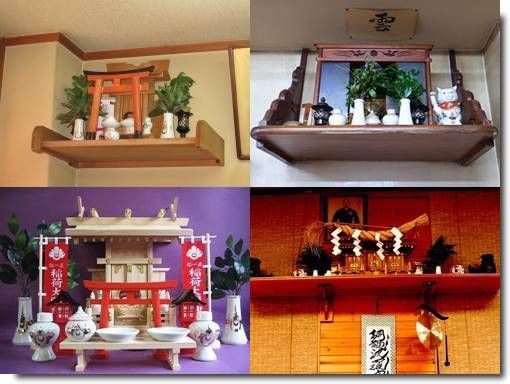
Above are examples of Kamidana setups
Tips for a tight budget: You can use a lego set, model set, or paper model set of a Japanese shrine as a Kamidana as well.
42 notes
·
View notes
Text

All living beings totally have the Buddha-nature:
The Tathagata abides [in them] constantly, without changing at all.
What is the point of the World-honored One’s words that “All living beings totally exist as the Buddha-nature“? It is the words “This is something ineffable coming like this” turning the Dharma wheel. Those called “living beings,” or called “the sentient,” or called “all forms of life,” or called “all creatures,” are living beings and are all forms of Existence. In short, Total Existence is the Buddha-nature, and the perfect totality of Total Existence is called “living beings.” At just this moment, the inside and outside of living beings are the Total Existence of the Buddha-nature.
--“Bussho,” or “The Buddha-Nature,” Dogen
All sentient beings reside
in the compassionate mind of the Buddha.
Likewise, all the Buddhas
dwell in our minds,
because our True Nature
is the Nature of Buddha
Tathata: The Essence of Reality in Buddhism
Tathata is often translated as "Suchness" or "Thusness," and this refers to the True Nature of Reality as it is, without the filters of our perceptions or concepts. Tathata is the experience of things as they are, free from our mental labels or judgments.
In other words, Tathata is like seeing a flower for the pure experience it provides, without thinking "beautiful flower" or "red flower" - just the flower in its pure existence without adding Mind's Labels and Conceptualization. This is the essence of Tathata, the recognition of reality in its raw, unfiltered form.
The term Tathagata, used by The Buddha to refer to Himself, is closely related to this concept. It means "One Who has thus gone" or "One Who has thus come," implying Someone Who has realized and embodied this Suchness. The Tathagata is the One who has fully awakened to the True Nature of Reality, free from delusions and false concepts.
While some might liken Tathata to the idea of "God" in other religions, the two concepts are fundamentally different. God, in many religious traditions, is seen as a permanent, all-powerful, and personal being. Tathata, however, is not a being or entity - it’s the very Nature of Reality itself, without form, beyond personality or permanence.
Buddhism teaches that our known world of concepts - our thoughts, beliefs, and perceptions - creates a veil over the True Nature of things. We live in a world where we label and categorize everything, but in doing so, we distance ourselves from the pure Suchness of Reality.
Meditating on Tathata is a direct path to enlightenment, where we see the world not as we think it should be, but as it is in its Suchness.
--Buddha Beings
5 notes
·
View notes